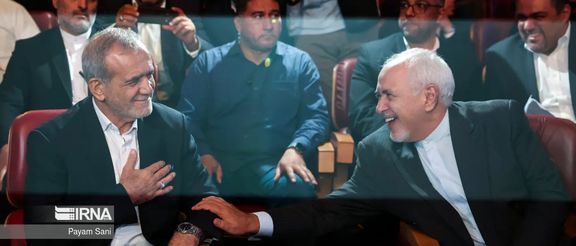The alleged disqualification stems from the Law on the Appointment of Individuals to Sensitive Positions, enacted on October 2, 2022. The law prohibits individuals who themselves, their spouse, or their children hold dual citizenship from being appointed to "sensitive" positions, including advisory or deputy roles to the president.
According to sources cited by Rouydad24, Zarif, who spent a significant portion of his career with the Iranian delegation at the United Nations in New York, had his children automatically acquire US citizenship as they were born during his assignment there. Although his children now reside in Iran, this has legally disqualified Zarif from holding the position of deputy to the president.
This law was not passed when he was chosen as foreign minister under former President Hassan Rouhani from 2013-2021.
Zarif, who publicly announced his resignation Sunday night, claimed his departure was not due to "disillusionment or disappointment" with Masoud Pezeshkian’s proposed administration. In an Instagram post, he insisted that his decision was rooted in doubts about his effectiveness in the strategic deputy role. "My message last night does not signify regret or disappointment with dear Dr. Pezeshkian...rather, it reflects my doubt about my usefulness in the strategic deputy role," Zarif stated.
However, many now believe that Zarif’s resignation was merely symbolic, as he had already been informed of his impending removal due to the Sensitive Positions Law.
Zarif himself later dismissed this version, saying he was not penalized because of his children's status.
Observers say the disqualification was a chance for Zarif to express his growing frustration with the direction of Pezeshkian's cabinet. On Sunday, Zarif revealed that of the 19 ministers proposed, only three were top choices recommended by a steering committee he headed, while ten were not on the council's list at all, casting serious doubt on the transparency and integrity of the selection process.
Zarif also expressed regret for not fulfilling his promises to include women, youth, and ethnic groups in the cabinet, signaling a retreat from the progressive agenda he had championed. "I am not satisfied with the outcome of my work and I am ashamed that I could not achieve the expert opinion of the committees and the inclusion of women, youth, and ethnic groups as I had pledged," Zarif lamented.
Despite his resignation, Zarif’s remarks on Monday, which appeared to contradict his earlier statements, have sparked speculations.
The cabinet list submitted by Pezeshkian to parliament has faced widespread criticism for being a regressive step. Despite earlier promises that 60% of the ministers would be under 50, the average age of the proposed cabinet is 59.7 years, leading to disappointment among those who had hoped for a younger, more dynamic government. The cabinet includes only one woman and no Sunni representatives, further alienating key segments of the population and raising doubts about Pezeshkian’s commitment to inclusivity and reform.







